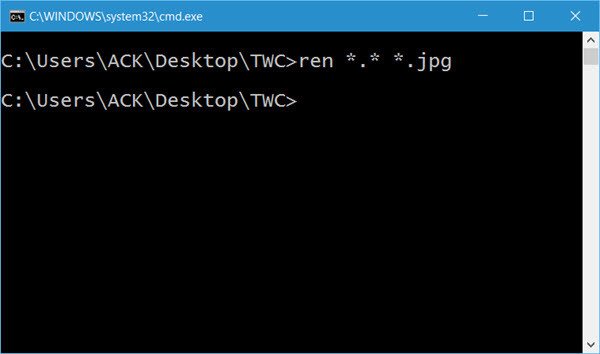
- #Batch file rename all files with extension mp4
- #Batch file rename all files with extension windows 10
- #Batch file rename all files with extension series
- #Batch file rename all files with extension windows
If you point it at something critical, you could break your operating system. It removes entire directories, including file structures and everything in-between. You can add parameters to both commands to delete and remove specific types of files or to simply remove everything.įair warning, the rmdir command is powerful and potentially dangerous. The Command Prompt has two powerful file removal commands at its disposal: DEL and rmdir.ĭEL is fairly self-explanatory as the command to delete a file, while rmdir is the command to remove an entire directory. Batch Delete Files Using the Command Prompt
#Batch file rename all files with extension mp4
mp4 files (please backup your files before testing any of these methods, just in.
#Batch file rename all files with extension windows
When it comes to batch deleting files on Windows 10, you have a few options. This tip is great if you for example want to batch rename all. Deleting anything more than a few files using File Explorer can become a lengthy process as Windows opts to enumerate each file before sending it packing. Now, most people don't have to delete 500,000 files spread over 45,000 folders regularly, but I'm sure we have all had the moment where your music collection is just no longer up to scratch.
#Batch file rename all files with extension windows 10
If you want more options, you can check out PowerShell's inbuilt examples using the following command: get-help Rename-Item –examples Batch Renaming on Windows 10 with the Bulk Rename Utility These are just a few of the batch rename options available to PowerShell. For example, the following command replaces an underscore with a hyphen Dir | Rename-Item –NewName You can use the same command to replace small snippets of a filename, too.

The following command renames all file extensions from text documents to rich text format documents: ren *.txt *.rtfīefore swapping out file extensions, I recommend taking a backup of the files just in case something goes wrong. That means you can attempt to rename files to similar file types, such as a Word document (.docx) to a text document (.txt), but you'll run into issues if you attempt to convert a Word document into a video type (such as. While this is handy, it can cause issues if you rename it to an incompatible file type. That means you can batch rename file extensions.

The ren command can also address file extensions. You can remove the "-budget" suffix using the following command: ren ?-budget.xlsx ?.xlsx
#Batch file rename all files with extension series
Say you have a series of documents named "jan-budget.xlsx," "feb-budget.xlsx," "mar-budget.xlsx," and so on. You can use batch file renaming to delete part of a filename, too. txt is a globbing pattern, where we use a as a wildcard to. If you want to add a prefix, move the "-test" part of the command to the front, like so: ren *.* test-?.* txt represents a file extension, it will be replaced with a new file extension. The second part (with all the question marks) tells the command to use the existing file names up to seven characters, but add "-test" as a suffix, while the asterisk again means apply to any file extension. So, "*.*" means find any file name, with any extension, in this folder. In this command, the asterisk wildcard acts in place of any characters. How about adding a suffix to a group of files? You can do that using the following command: ren *.* ?- test.* Here, the question mark wildcard acts as any character, allowing the command to find any matching files while outputting the renamed files. For example, if you want to change the number of digits in your file names, you can use the following command: ren document?.txt document3?.txt If you want to rename multiple files, you can use the wildcard characters to make changes. The command to rename a single file is: ren filename.jpg newfilename.jpg

Type dir and press Enter to see the list of files. Go to the directory where your files are stored, which you want to rename using the terminal, and run the vimv command.Head to the folder containing the files you wish to rename, hit Shift + Right Click, and select Open a command window here. To get this utility on your system from Github, use the following git clone command: git clone Īfter you clone the Vimv Git repository on your system, use the cp command to copy the binary file to your $PATH variable and change permissions on this file to make it executable. You can use the Vimv utility to rename Linux files in a batch. This command will change extension of all the files in the current directory from. Similarly, you can also change the file extension of all these files as follows: rename.ul html xml *.html Open File Explorer, go to a file folder, select View > Details, select all files, select Home > Rename, enter a file name, and press Enter. One way to make this work recursively is with the FOR command.

This command will rename multiple files in the current directory from record to script. If you want to change all extensions, just use the wildcard again: ren. To rename multiple files without changing the file extensions, use the following rename utility command: rename.ul record script *.html


 0 kommentar(er)
0 kommentar(er)
